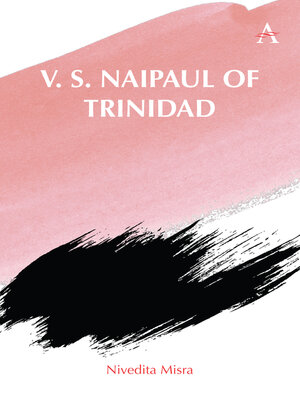
Sign up to save your library
With an OverDrive account, you can save your favorite libraries for at-a-glance information about availability. Find out more about OverDrive accounts.
Find this title in Libby, the library reading app by OverDrive.



Search for a digital library with this title
Title found at these libraries:
| Library Name | Distance |
|---|---|
| Loading... |
The book is about V. S. Naipaul who was born in Trinidad in 1932. At the age of 18, Naipaul left Trinidad on a scholarship to study literature at Oxford. He never returned to live in Trinidad. His first book was published in 1956, and by the time Trinidad achieved political independence in 1962, he had published four books and was firmly established as a writer in England. By the time Trinidad became a republic in 1976, Naipaul had written 13 books and had travelled through much of the postcolonial world. This book highlights how Trinidad and Naipaul were bound in a love-hate relationship where Naipaul continued to pass Trinidad off as a cynical island where "nothing was created" while Trinidad had its share by laying back a claim on him and his writing. It is generally perceived that Naipaul shunned his place of birth as he called his birth in Trinidad a "mistake," Trinidad an "unimportant, uncreative, cynical" place and the Caribbean as the "Third World's Third World." His refusal to acknowledge Trinidad in his initial response to receiving the Nobel Prize added insult to injury. Yet, he was deeply bound to the island of Trinidad and his roots in the Indo-Trinidadian community. This book makes Naipaul's connection to Trinidad more than evident and as such adds to the present body of knowledge.
|The book comes at a time when V. S. Naipaul has passed away, and it is important to assess his place within the Caribbean as compared to elsewhere. As the book positions itself in Trinidad, it provides an alternative view of Naipaul's career from a non-metropolitan point of view. The book contrasts how Naipaul was read and received in the Caribbean against his reputation in the metropolitan centres.
The book is organized decade by decade, with 1950s beginning in 1950 to 1959, 1960s beginning with 1960 to 1969, etc. There are possibly two exceptions: A House for Mr Biswas (1961) is treated as a 1950s novel because it is thematically linked to his writings in the 1950s; "The Killings in Trinidad and The Death of Eva Peron" (1980) are about the happenings in 1970s and were published in 1980 only due to legal issues.
The book places the writings of Naipaul in a dynamic dialogue with the events taking place in Trinidad. There is no event of political or historical importance in Trinidad (1950s–1990s) that went unnoticed and unwritten about by Naipaul. He was a writer who wrote for his countrymen because he realized that it was his countrymen that most enjoyed his writings. Though he lived in England and was grateful for the global recognition his writing received, he knew that his writing spoke only to the true Trinidadian who appreciated him, his stances and his rebuffs.







